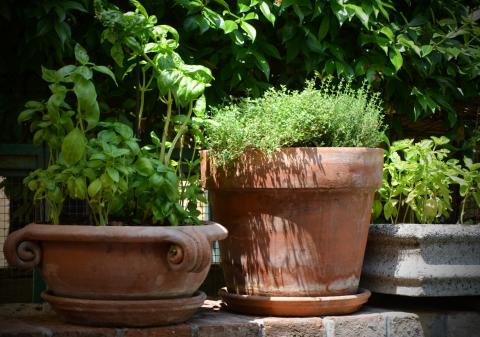Growing Herbs in Containers

Herbs are easily grown in containers and can make a great addition to any sunny small garden, balcony, patio, or front stoop. Container grown herbs are perfect for anyone with limited space or time to garden. The uses of herbs are many, and almost any herb can be grown in a container as long as the right growing conditions are provided. If your container garden site receives at least six or more hours of direct sun a day, your herbs should perform well.
Start by choosing the right containers for your herbs. An appropriate container will provide enough room to support the plant’s roots throughout the entire growing season, will be stable enough to support the plant and not tip over in the wind, and provide adequate drainage. Containers should be wide and deep enough for the herbs planted. Containers that are too small tend to dry out quickly and cause plants to wilt. On the other hand, pots that are too large often stay wet for too long and may lead to root rot. It’s essential that all containers have a drainage hole(s) in the bottom to allow excess water to drain freely.
A quality soilless potting mix is the best choice for growing herbs and can be found at any garden center. Soilless mixes are called such because they do not contain any garden soil. Instead, they are primarily composed of peat, perlite, and vermiculite, bark, or coconut hulls – materials that hold moisture while also providing good aeration.
When it comes time to select the herbs you grow, pay attention to whether they are annuals or perennials. Annual herbs such as cilantro and basil will only produce for one season, whereas perennial herbs such as rosemary, thyme, and lemon verbena can live for years if they are brought indoors for the winter. Also, don’t forget to pay attention to the growing requirements of your individual plants. Most herbs prefer moist, well-drained soils and can be planted together in the same container. Other herbs, such as rosemary, prefer things on the drier side and perform better when planted singly.
Most herbs are quite easy to grow and will reward you throughout the season and possibly beyond. Try growing your own fresh herbs in containers this summer!
Got questions? The Ask UNH Extension Infoline offers practical help finding answers for your home, yard, and garden questions. Call toll free at 1-877-398-4769, Monday to Friday, 9 a.m. to 2 p.m., or e-mail us at answers@unh.edu.
